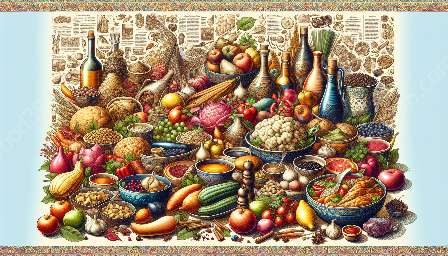Climate change has had a profound impact on early food production, shaping early agricultural practices, food cultures, and the evolution of food culture. The changes in climate altered the availability of resources and influenced the development of early food systems, which laid the foundation for modern food culture. Understanding this historical context is crucial for comprehending the present challenges and finding sustainable solutions.
Early Agricultural Practices
The impact of climate change on early food production is closely linked to the development of early agricultural practices. As climate variability affected the availability of water and arable land, early human societies had to adapt their farming techniques and food production methods. In response to changing climatic conditions, early agricultural practices evolved to include crop diversification, irrigation systems, and soil conservation methods.
Moreover, the domestication of plants and animals was influenced by climate change. Certain species thrived in specific environmental conditions, prompting early agricultural communities to select and cultivate crops and livestock that were well-suited to the prevailing climate. This process of natural selection and adaptation shaped the genetic diversity of food crops and livestock, laying the groundwork for food production in diverse ecological settings.
Food Cultures
The impact of climate change on early food production also influenced the development of food cultures. As early agricultural practices adapted to changing climates, food preferences and culinary traditions were shaped by the availability of locally grown produce and native livestock. Regional variations in climate led to distinct food cultures, as different communities developed unique cuisines based on their local resources and environmental conditions.
Moreover, the impact of climate change on early food production has been reflected in cultural practices and religious rituals associated with food. Offerings to deities, seasonal festivals, and traditional food preservation techniques were often rooted in the challenges and successes of early food production in the face of climatic variability.
Origin and Evolution of Food Culture
The origin and evolution of modern food culture can be traced back to the impact of climate change on early food production. The ecological constraints and opportunities created by climate variability influenced the development of early food systems, which laid the foundation for the diversity of food cultures around the world.
Understanding the historical interaction between climate change and early food production provides valuable insights for addressing contemporary challenges related to food security and sustainability. The lessons from early agricultural practices and food cultures highlight the importance of resilience, adaptation, and innovation in the face of changing environmental conditions.
Conclusion
The impact of climate change on early food production has left a lasting imprint on the development of agricultural practices, food cultures, and the evolution of food culture. By understanding the historical context of early food production in the context of changing climates, we can gain valuable insights that are relevant to addressing present-day challenges in food security and sustainability. By recognizing the interplay between climate change and early food production, we can work towards creating sustainable and resilient food systems for the future.


